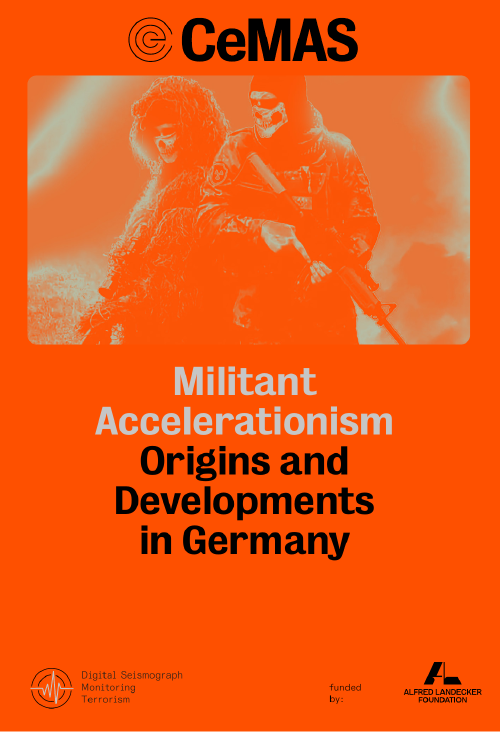The CeMAS report “Militant Accelerationism - Origins and Developments in Germany” is both a summary and a reference work for the offline and online activities of militant far-right accelerationists in Germany. After an introduction to the history of international far-right accelerationism, the report provides an overview of the scene and its groups in Germany.
Right-wing extremist militant accelerationism aims to bring about the collapse of liberal, democratic and capitalist societies. To this end, existing conflicts or perceived processes of decay in these societies are to be accelerated. This can be done both through attempts to manipulate public discourse and through terrorist means. Militant accelerationism is an internationally observable phenomenon and in Germany, too, there are groups and individuals who can be assigned to this right-wing terrorist scene.
Right-wing extremist militant accelerationists organise and form themselves primarily in loose digital networks. As the platform did not regularly remove their content, the scene’s communication shifted to the online platform Telegram in the second half of the 2010s. The network itself as well as outside observers refer to this cluster as Terrorgram. Far-right militant accelerationism has spread not only on Telegram, but also on far-right “chan” imageboards, on which the March 2019 Christchurch, New Zealand shooter posted his own ideas about accelerationism.
In Germany, since 2018, there have been at least five groups and several individuals prepared to carry out attacks, attributable to militant accelerationism. The right-wing extremist terrorist attack in Halle, which left two dead and two injured in 2019 is also attributable to right-wing extremist militant accelerationism. Investigations into the “planning of a serious act of violence endangering the state” are currently underway against at least three defendats. Another person has already been sentenced to two years of imprisonment.
The CeMAS report makes it clear that the digital space as a platform for radicalisation is not taken seriously enough by authorities and politicians. Thus, access to right-wing extremist online subcultures is now easier than ever, even for minors. Social media platforms must also face up to their responsibility and be able to recognise and counter right-wing attempts to appropriate space. As a society, we need to better understand the role social media plays in radicalisation and the spread of disinformation. This requires in-depth and long-term research. As a society, the aim is not only to prevent such acts, but also to prevent the upstream radicalisation. Often, the solutions focus on reducing right-wing terrorist content. However, we will only achieve a solution to a societal problem if we address the reasons for the demand for this content.
